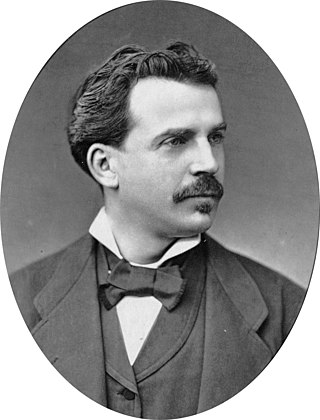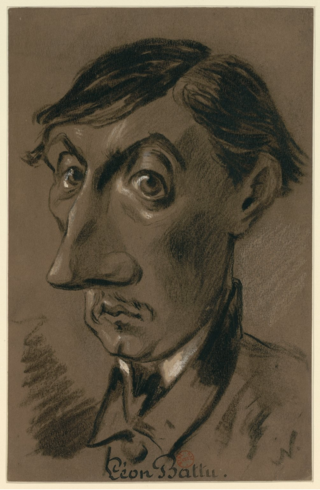Related Research Articles

Jules-Henri Vernoy de Saint-Georges was a French playwright, who was born and died in Paris. He was one of the most prolific librettists of the 19th century, often working in collaboration with others.
Jules-Adenis de Colombeau was a 19th-century French opera librettist, playwright, and journalist.

Les diamants de la couronne is an opéra comique by the French composer Daniel Auber, first performed by the Opéra-Comique at the second Salle Favart in Paris on 6 March 1841. The libretto is by Auber's regular collaborator, Eugène Scribe with the help of Jules-Henri Vernoy de Saint-Georges.

The Théâtre Lyrique was one of four opera companies performing in Paris during the middle of the 19th century. The company was founded in 1847 as the Opéra-National by the French composer Adolphe Adam and renamed Théâtre Lyrique in 1852. It used four different theatres in succession, the Cirque Olympique, the Théâtre Historique, the Salle du Théâtre-Lyrique, and the Salle de l'Athénée, until it ceased operations in 1872.
Louis Michel Adolphe Deloffre was a French violinist and conductor active in London and Paris, who conducted several important operatic premieres in the latter city, particularly by Charles Gounod and Georges Bizet.

Les dragons de Villars is an opéra-comique in three acts by Aimé Maillart to a libretto by Lockroy and Eugène Cormon. The story of the opera was said to have been borrowed from La Petite Fadette by George Sand, updated by the librettists to the time of Louis XIV. It was premiered by the Théâtre Lyrique in Paris on 19 September 1856. It is also known by the English title The Hermit's Bell

Marie Cabel was a Belgian coloratura soprano. She is probably best remembered for having created the role of Philine in Ambroise Thomas's opera Mignon.
Edmond Cabel was a French operatic tenor.

Léon Melchissédec was a French baritone who enjoyed a long career in the French capital across a broad range of operatic genres, and later made some recordings and also taught at the Paris Conservatoire.

Jean-Vital Jammes was a French opera singer. During a stage career spanning 40 years, he created many leading baritone roles, including Zurga in Bizet's Les pêcheurs de perles and Ourrias in Gounod's Mireille. Born in Le Passage d'Agen near the town of Agen, he was largely self-taught and made his stage debut in 1841 at the age of 16. After singing in several provincial theatres, he was engaged by the Théâtre Lyrique in Paris and later by the Opéra-Comique. Following his retirement from the stage, Ismaël lived in Marseille where he died at the age of 68.

Léon Battu was a French dramatist, born 1829 in Paris, where he died on 22 November 1857.

Jean Delvoye was a Belgian baritone, who, after working in the French provinces, enjoyed a long career in Paris, centred on the Opéra-Comique, and left some recordings representative of his repertoire.
Claude-Nicolas-Henry Boisseaux was a 19th-century French playwright and opera librettist.
Eugène Gaston Mestépès was a 19th-century French librettist, playwright and theatre director.
Charles Delange ( –1871) was a 19th-century French chansonnier.

Toussaint-Eugène-Ernest Mocker was a French opera singer and stage director. In his 30-year career as a principal singer at the Théâtre Impérial de l'Opéra-Comique he created numerous roles in the company's world premieres and from 1860 served as a stage director there. In his later years he was a singing teacher at the Conservatoire de Paris.

Charles-Amable Battaille was a French operatic bass. Appreciated both for his voice and his acting skills, he premiered the main bass roles for the works represented at the Opéra-Comique between 1848 and 1857, and is especially notable as the first singer of the role of Peter the Great in Meyerbeer's L'Étoile du nord (1854).
Marie-Françoise-Adélaïde Gavaudan, called Mlle Gavaudan cadette and nicknamed Spinette (1767–1805), was a French operatic soprano.

Marguerite Vaillant-Couturier was a French soprano who made her debut in Brussels at La Monnaie in 1880 in the title role of Gounod's Mireille. After appearing in Marseille the following year, she sang in operettas in Paris in the early 1880s. On 19 October 1882, she created the role of Micaëla in Lecocq's Le cœur et la main at the Théâtre des Nouveautés in Paris. In 1888, she gained success in the title role of Bizet's Carmen at the Opéra-Comique. She also appeared in Buenos Aires and Saint Petersburg.
References
Notes
- 1 2 Kutsch & Riemens 2003, p. 1741.
- 1 2 Walsh TJ. Second Empire Opera – The Théâtre-Lyrique Paris 1851-1870. John Calder Ltd, London, 1981.
- ↑ Soubies A, Malherbe C. Histoire de l'opéra comique — La seconde salle Favart 1840–1887. Flammarion, Paris, 1893.
- ↑ Wolff, Stéphane. Un demi-siècle d'Opéra-Comique 1900–1950. André Bonne, Paris, 1953.
Sources
- Kutsch, K. J. and Riemens, Leo (2003). Großes Sängerlexikon (fourth edition, in German). Munich: K. G. Saur. ISBN 9783598115981.